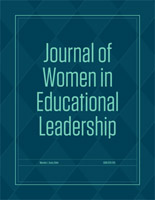Educational Administration, Department of

Journal of Women in Educational Leadership
Date of this Version
4-2009
Document Type
Article
Citation
2009 Pro>Active Publications
Abstract
The preparation of preservice administrators and teachers poses daunting challenges for the academy. Federal mandates associated with the No Child Left Behind Act (NCLB) and The Individuals with Disabilities Education Act (IDEA), and the pressure on school districts to produce high-perform- ing students despite inadequate financial resources, have shifted public ed- ucation's focus towards youth's academic proficiency. The linear focus has trumped the nurturing role school personnel could and should fulfill in ad- dition to scholastic achievement.
Foster care youth, in particular, validate the need for educational leaders who can nurture the overall emotional well-being of vulnerable children. The blase philosophy that public education should provide equal treatment of all children, a notion that a balanced playing field ensures success for children identified as at-risk, is not viable. In reality, children in foster care arrive at the schoolhouse door often harboring emotional scars associated with their abuse and neglect. Their plight poses a twofold question: "Should school administrators provide differentiated leadership on behalf of youth in foster care? If so, what should constitute it?"


Comments
Journal a/Women in Educational Leadership, Vol. 7, No. 2-ApriI2009 ISSN: 1541-6224